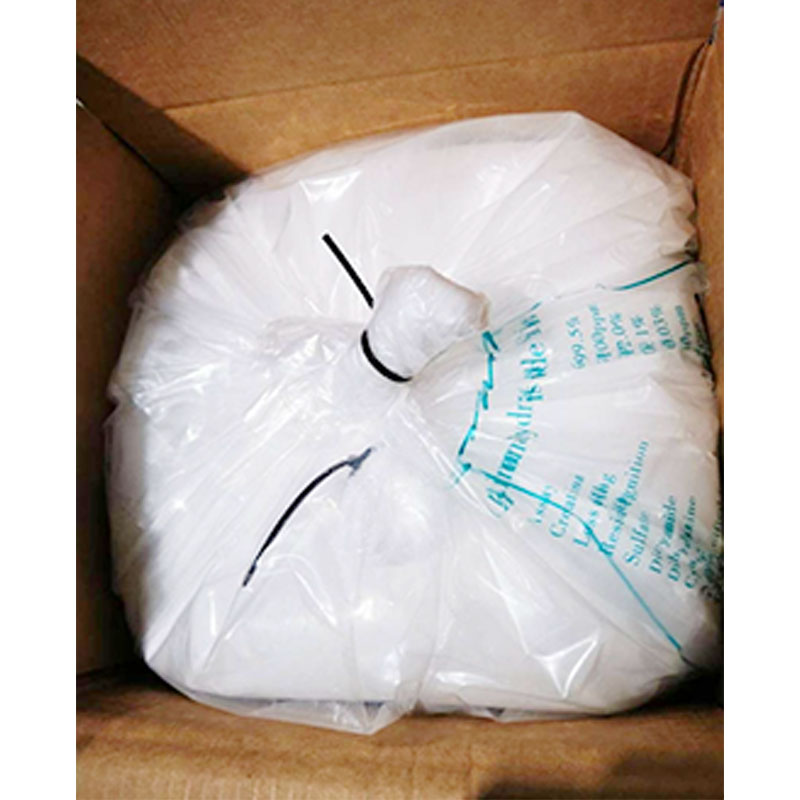How does creatine anhydrous affect the body's creatine synthesis and storage mechanism?
Release Time : 2025-01-28
Creatine anhydrous, also known as creatine (Creatine) or creatine anhydrous anhydride, is a natural nutrient present in human muscle tissue. It plays an important role in the body's energy metabolism and muscle function. Especially for athletes and high-intensity physical activity, creatine anhydrous is a highly respected nutritional supplement. So, how does creatine anhydrous affect the body's creatine synthesis and storage mechanism?
First, we need to understand the source of creatine. Creatine in the human body can be synthesized by itself or taken from food. The main raw materials for synthesizing creatine include arginine, glycine and methionine. These amino acids are converted into creatine after a series of enzymatic reactions in the kidneys and liver. As a pure form of creatine, the intake of creatine anhydrous can quickly increase the creatine level in the muscle.
When creatine anhydrous enters the human body, it is first absorbed into the blood and then transported to muscle tissue through the blood. In the muscles, creatine anhydrous is converted into creatine phosphate, a high-energy phosphate compound in the muscles that can store and quickly release energy. When the muscles contract and the energy demand increases, creatine phosphate can be quickly broken down to release energy for the muscles to use, thereby supporting high-intensity, short-term exercise performance.
The intake of creatine anhydrous not only increases the creatine phosphate reserves in the muscles, but also promotes the activity of creatine synthase, further enhancing the ability to synthesize creatine. This means that long-term and appropriate supplementation of creatine anhydrous can increase the content of creatine and creatine phosphate in the muscles, improve the energy storage capacity and endurance of the muscles.
In addition, creatine anhydrous also helps reduce muscle fatigue. During high-intensity exercise, ATP (adenosine triphosphate) in the muscles is rapidly consumed, leading to muscle fatigue. Creatine phosphate can quickly resynthesize ATP, thereby delaying the occurrence of muscle fatigue and improving exercise performance.
However, it is worth noting that although creatine anhydrous has a positive effect on muscle function and energy metabolism, excessive intake may also bring some side effects, such as gastrointestinal discomfort and dehydration. Therefore, when using creatine anhydrous as a nutritional supplement, the principle of moderation should be followed and it should be done under the guidance of professionals.
In summary, creatine anhydrous has a positive effect on improving muscle function and energy metabolism by promoting the synthesis and storage of creatine and increasing the reserve of creatine phosphate. However, its use should also be cautious to ensure that it can play its role safely and effectively.
First, we need to understand the source of creatine. Creatine in the human body can be synthesized by itself or taken from food. The main raw materials for synthesizing creatine include arginine, glycine and methionine. These amino acids are converted into creatine after a series of enzymatic reactions in the kidneys and liver. As a pure form of creatine, the intake of creatine anhydrous can quickly increase the creatine level in the muscle.
When creatine anhydrous enters the human body, it is first absorbed into the blood and then transported to muscle tissue through the blood. In the muscles, creatine anhydrous is converted into creatine phosphate, a high-energy phosphate compound in the muscles that can store and quickly release energy. When the muscles contract and the energy demand increases, creatine phosphate can be quickly broken down to release energy for the muscles to use, thereby supporting high-intensity, short-term exercise performance.
The intake of creatine anhydrous not only increases the creatine phosphate reserves in the muscles, but also promotes the activity of creatine synthase, further enhancing the ability to synthesize creatine. This means that long-term and appropriate supplementation of creatine anhydrous can increase the content of creatine and creatine phosphate in the muscles, improve the energy storage capacity and endurance of the muscles.
In addition, creatine anhydrous also helps reduce muscle fatigue. During high-intensity exercise, ATP (adenosine triphosphate) in the muscles is rapidly consumed, leading to muscle fatigue. Creatine phosphate can quickly resynthesize ATP, thereby delaying the occurrence of muscle fatigue and improving exercise performance.
However, it is worth noting that although creatine anhydrous has a positive effect on muscle function and energy metabolism, excessive intake may also bring some side effects, such as gastrointestinal discomfort and dehydration. Therefore, when using creatine anhydrous as a nutritional supplement, the principle of moderation should be followed and it should be done under the guidance of professionals.
In summary, creatine anhydrous has a positive effect on improving muscle function and energy metabolism by promoting the synthesis and storage of creatine and increasing the reserve of creatine phosphate. However, its use should also be cautious to ensure that it can play its role safely and effectively.





